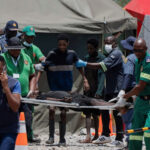President Emmerson Mnangagwa’s ambition to extend his term beyond the constitutionally mandated 2028 limit faces a formidable obstacle: the Zimbabwean military.
Despite his public pronouncements of upholding constitutionalism, the military, a key player in Zimbabwean politics, appears poised to block any attempts to prolong his presidency, The News Hawks has reported.
This defiance comes as Mnangagwa navigates a complex internal power struggle with his Vice-President, Constantino Chiwenga, a key figure in the 2017 coup that brought Mnangagwa to power. The battle for control over state resources and political influence is intensifying, with the military’s stance adding another layer of complexity to the already tense situation.
A military insider, speaking on condition of anonymity, revealed: “The army’s stance is unequivocal. The President is required to complete his constitutional second term and retire in 2028. From a military perspective, he should not have even been eligible for a second term. Although he publicly agrees to retire in 2028, he is privately signaling his supporters to push for a constitutional amendment to extend his term until 2030. This proposal is unpopular among the security forces and the general public, with only a few self-interested individuals supporting it.”
The military’s influence on Zimbabwean politics is undeniable. A recent report by the Zimbabwe Democracy Institute highlights the military’s crucial role in shaping the country’s political landscape: “The military has historically played a central role in Zimbabwean politics. As ZANU PF faces a significant succession battle, the military’s influence in intra-party politics will become more apparent, although it has not been overtly visible yet. The military is unlikely to remain passive in selecting Zanu PF’s new leader and the country’s head of state.”
The report further emphasizes the military’s potential veto power in leadership elections: “It is probable that the military will exercise veto power in leadership elections, as it has done in the past.
The office of the head of state is seen as requiring military credentials, and this likely extends to the Zanu PF leadership position as well. Consequently, the successor to President Mnangagwa is expected to be a military figure or a candidate backed by the military, rather than a civilian politician.”
The military’s influence is not a recent phenomenon. Its role in the 2017 coup against Robert Mugabe solidified its position as a cornerstone of power in Zimbabwe. The report underscores the military’s enduring influence: “Despite 44 years of independence, the military remains a cornerstone of power in Zimbabwe, as seen during the 2017 coup against Mugabe. The next leader will need strong military connections to succeed in a party lacking a structured leadership succession plan.”
The current succession debate within Zanu PF, characterized by factionalism, further fuels the volatile political landscape. Understanding the military’s internal dynamics and its stance on extending Mnangagwa’s presidency is crucial for navigating the complexities of Zimbabwean politics.
The military’s influence is profound and enduring, shaping both Zanu PF and the broader political landscape. Addressing these dynamics is crucial for Zimbabwe’s path to democratic governance and upholding constitutional principles.












